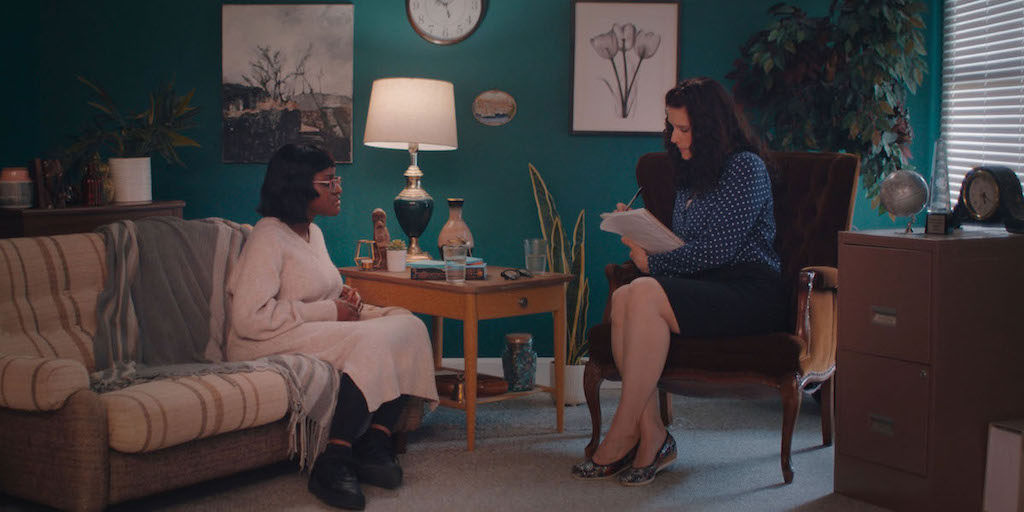New York City, Feb 2 – What do you think of when you hear the words Dissociative Identity Disorder? Is it a term that causes fear? Maybe it’s a phrase you would only think of when watching a film such as Split, where the protagonist with this disorder is set up to be a villain. Our culture has slowly built a monster to be feared when it comes to severe mental illnesses. An individual with Dissociative Identity Disorder, or D.I.D., is almost invisible, serving as fodder for villain tropes in genre movies, as cheap jokes, or as examples of people who have failed society, instead of being individuals that society itself has failed.
This mythos is the complicated reality that Kitoko Mai, one of the most charismatic heroines you might come across this year, has to detangle when she finds herself diagnosed with D.I.D. in the short film Thriving: A Dissociated Reverie.
Written by Kitoko Mai and directed by Nicole Bauzin, Thriving: A Dissociated Reverie is a surrealist journey into Kitoko’s world that takes any preconceived notion of the disorder and twists it in a playful yet insightful manner. After decades of this disorder being inauthentically portrayed, and usually, by white men, Kitoko takes us into their own perspective in a refreshing manner. We walk through Kitoko’s journey to a diagnosis, and how they have learned to embrace every part of them literally and figuratively.
Kitoko’s specific gaze gives us a window into their quirky world. Saturated colors, 70’s theme music, and dreamlike animation all depart from reality in a way that still feels natural. With sharp cuts and some of the wittiest dialogue in this Sundance short block, it is clear that Kitoko never romanticizes her disorder but has fun with the whimsy and irony of it all. This makes it so we are never laughing at her, but laughing alongside her, while also understanding the depth of Kitoko’s struggle. A lot of the power within Thriving: A Dissociated Reverie is that it never caters to a neurotypical and nondisabled audience, and it doesn’t apologize for how Kitoko’s experience also intersects with their Black identity and labor as a sex worker. Nevertheless, this film feels informative from this authentic perspective. It shows a humane look into how we could all understand and care for people in our community with dissociative disorders.
Kitoko first introduces herself as someone who has been living with “intrusive thoughts, flashbacks, night terrors, and self-harm…” We learn that Kitoko is one of the “alters” (alternate personality) who is characterized by being “anxious, asexual, and in charge of the body’s artistic practice.” Kitoko often finds herself with gaps in her memory because Cheyenne, a “sexual protector alter” will take over, running the body. Cheyenne is a sex worker who was born as an alternate personality due to Kitoko’s history of sexual assault. Aesthetically, the cinematography depicts these constant switches and contrasting personalities through vivid colors and frequent match cuts. Through this format, we learn of Kitoko’s other alters and their own origins. At some point, Kitoko’s therapist mentions that “D.I.D. tends to develop in childhood as a coping mechanism to dealing with severe trauma. Each alter has a role and they represent different emotional states.” By intimately learning each of Kitoko’s alters, their origins, and each of their personalities, we get to know Kitoko Mai intimately as a person.
Kitoko Mai acts as a one-woman show, walking us through each alter and it’s easy to fall in love with each one. Getting to know the individual first instead of the disorder allows anyone to understand that “severe” mental disorders aren’t meant to be met with fear. On the contrary, Kitoko Mai is a survivor of their circumstances and her mind’s capability to adapt should be treated with empathy and respect first. Kitoko’s sense of humor adds to this as well. When a doctor first explains and diagnoses D.I.D., she runs through a scary laundry list of symptoms. Kitoko blinks back and then simply states “Wow, I hate that for me.” Throughout, Kitoko’s sense of humor not only adds levity but it gives them agency. They are not just a collection of these scary symptoms but someone you want to know, possibly as a friend or as an artist, or possibly someone you might already know.
Thriving: A Dissociated Reverie is a wonderful example of the importance of authentic representation of rare and stereotyped disabilities. One of the biggest hurdles Kitoko has to tackle is the shame engrained in our culture when it comes to D.I.D. Kitoko wonders aloud: “I’ve only heard of D.I.D. in movies as a condition that deviants and serial killers have. So, I wondered ‘Am I a monster?’”
One of the first examples of a movie centering on D.I.D. is Sybil, where Sally Field plays a woman with 16 alters. However, Sybil is portrayed as primarily hysterical, and her mental disorder is exploited as a form of entertainment. This became people’s first encounter with D.I.D. in the 1970s, causing significant fear. In some ways, this has set the stage for disorders like dissociative disorders, schizophrenia, and others to be seen as reasons to cast aside the mentally ill in our lives. Instead of asking ourselves how we can better represent mental illness in healthcare, the work sector, or in popular culture, it’s become easier to ask how we can best avoid the severely “mad.” This is perhaps why Thriving: A Dissociated Reverie is revolutionary. Kitoko Mai and Nicole Bazuin unapologetically show the perspectives that the media fights so hard to invisibilize, pointing out that people like Kitoko not only exist but thrive every day in the face of an impossible society. They ask us to imagine the possibilities if we saw people with dissociative disorders as victims of severe trauma first, with a strong ability to adapt, before registering these individuals as monsters or problems in our society.
The most moving moment might be when Kitoko embraces herself fully. Overall, Kitoko has given us an honest look into her world that shows the hardship, but also their mental strength, she states that it’s “exhausting, sometimes I’m barely surviving.” What helps Kitoko survive is a full acceptance of their disorder and the tools they use, such as reminders due to bad memory, to make the world more accessible for them:
“Collaborating with my disability means working with the conditions I have – not against them.”
Empowering, fun, profound, sexy, and a vivid explosion of color, Thriving: A Dissociated Reverie will make you fall in love with Kitoko’s power and Bazuin’s visual feast. It is a love letter to the potential of cinema as well as an experiment in exploring some of the most complex and nuanced human experiences. Thriving: A Dissociated Reverie shows just how important it is to have diverse disabled voices helming the camera as it uncovers a whole new facet of humanity.








